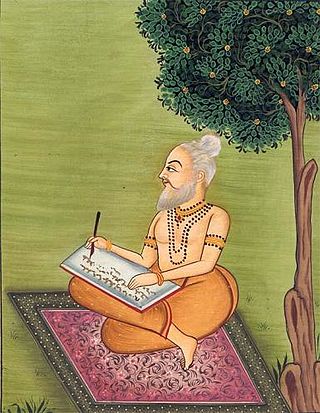Mystery, The Mystery, Mysteries or The Mysteries may refer to:
A trial is the presentation of information in a formal setting, usually a court.

Valmiki was a legendary poet who is celebrated as the traditional author of the epic Ramayana, based on the attribution in the text itself. He is revered as Ādi Kavi, the first poet, author of Ramayana, the first epic poem.
Master or masters may refer to:
Godfather, God Father, or variants may refer to:
Doctor or The Doctor may refer to:
A boyfriend is a regular male companion in a romantic or sexual relationship.
Householder may refer to:
Special or specials may refer to:
Thirteen or 13 may refer to:

A Balmiki temple is called an Ashram, which means a hermitage or monastery. It is the communal house for Balmikis. The function of the Ashram is to serve as a center for building up devotees' commitment and for transmitting the Ramayana's message, and the focal point for the whole community to preserve their culture and traditions.

Advaita Ashrama, Mayavati, is a branch of the Ramakrishna Math, founded on 19 March 1899 at the behest of Vivekananda, by his disciples James Henry Sevier, and Charlotte Sevier. Today it publishes the original writings of Vivekananda. As an ashram dedicated to the study and practice of Advaita Vedanta, no images or idols are worshipped there, not even of Ramakrishna; and no images were kept in the premises according to the Ashram ideals set by Vivekananda.
Beast most often refers to:

Swarupananda was a direct monastic disciple of Vivekananda and the first president of the Advaita Ashrama, set up by Vivekananda in 1899 at Mayavati, near Champawat. The ashram is a branch of the religious monastic order, Ramakrishna Math, also set up by Vivekananda on the teachings of his guru Ramakrishna.
Love Story or A Love Story may refer to:

Yoga tourism is travel with the specific purpose of experiencing some form of yoga, whether spiritual or postural. The former is a type of spiritual tourism; the latter is related both to spiritual and to wellness tourism. Yoga tourists often visit ashrams in India to study yoga or to be trained and certified as yoga teachers. Major centres for yoga tourism include Rishikesh and Mysore.
This page is based on this
Wikipedia article Text is available under the
CC BY-SA 4.0 license; additional terms may apply.
Images, videos and audio are available under their respective licenses.




